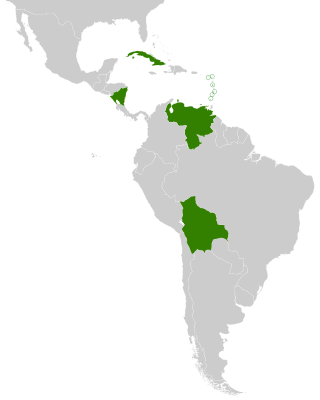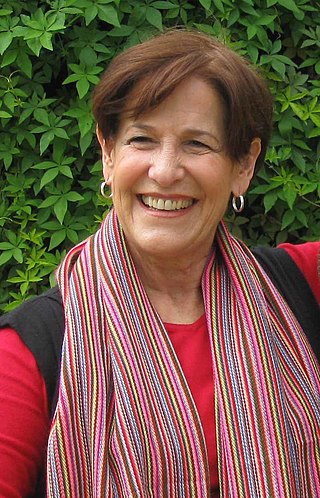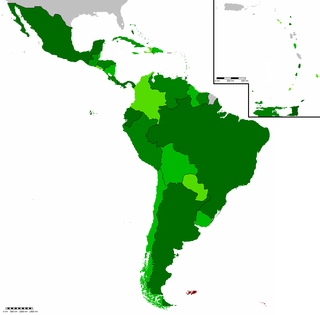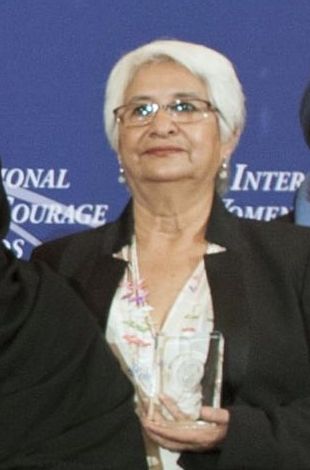Related Research Articles

Cuba's foreign policy has been fluid throughout history depending on world events and other variables, including relations with the United States. Without massive Soviet subsidies and its primary trading partner, Cuba became increasingly isolated in the late 1980s and early 1990s after the fall of the USSR and the end of the Cold War, but Cuba opened up more with the rest of the world again starting in the late 1990s when they have since entered bilateral co-operation with several South American countries, most notably Venezuela and Bolivia beginning in the late 1990s, especially after the Venezuela election of Hugo Chávez in 1999, who became a staunch ally of Castro's Cuba. The United States used to stick to a policy of isolating Cuba until December 2014, when Barack Obama announced a new policy of diplomatic and economic engagement. The European Union accuses Cuba of "continuing flagrant violation of human rights and fundamental freedoms". Cuba has developed a growing relationship with the People's Republic of China and Russia. In all, Cuba continues to have formal relations with 160 nations, and provided civilian assistance workers – principally medical – in more than 20 nations. More than one million exiles have escaped to foreign countries. Cuba's present foreign minister is Bruno Rodríguez Parrilla.

Nicaragua, officially the Republic of Nicaragua, is the largest country in Central America, bordered by Honduras to the north, the Caribbean to the east, Costa Rica to the south, and the Pacific Ocean to the west. Managua is the country's capital and largest city. As of 2015, it was estimated to be the second largest city in Central America. Nicaragua's multiethnic population of six million includes people of mestizo, Indigenous, European and African heritage. The main language is Spanish. Indigenous tribes on the Mosquito Coast speak their own languages and English.

The Organization of American States is an international organization that was founded on 30 April 1948 for the purposes of solidarity and co-operation among its member states within the Americas. Headquartered in the United States capital, Washington, D.C., the OAS has 35 members, which are independent states in the Americas. Since the 1990s, the organization has focused on election monitoring. The Secretary General of the OAS is Uruguayan Luis Almagro.

ALBA or ALBA–TCP, formally the Bolivarian Alliance for the Peoples of Our America or the Bolivarian Alliance for the Peoples of Our America – Peoples' Trade Treaty, is an intergovernmental organization based on the idea of political and economic integration of Latin American and Caribbean countries.

Susana María del Carmen Villarán de la Puente is a centre-left politician in Peru, a former presidential candidate, and in municipal elections in 2010 became the first woman to be elected Mayor of Lima.
The Gruber Prize for Women's Rights, established in 2003, was one of five international prizes worth US$500,000 awarded by The Peter and Patricia Gruber Foundation, an American non-profit organization.

The status of women in Argentina has changed significantly following the return of democracy in 1954; and they have attained a relatively high level of equality. In the Global Gender Gap Report prepared by the World Economic Forum in 2009, Argentine women ranked 24th among 134 countries studied in terms of their access to resources and opportunities relative to men. They enjoy comparable levels of education, and somewhat higher school enrollment ratios than their male counterparts. They are well integrated in the nation's cultural and intellectual life, though less so in the nation's economy. Their economic clout in relation to men is higher than in most Latin American countries, however, and numerous Argentine women hold top posts in the Argentine corporate world; among the best known are Cris Morena, owner of the television production company by the same name, María Amalia Lacroze de Fortabat, former CEO and majority stakeholder of Loma Negra, the nation's largest cement manufacturer, and Ernestina Herrera de Noble, director of Grupo Clarín, the premier media group in Argentina.

María Fernanda Espinosa Garcés is an Ecuadorian politician and diplomat. She was the President of the United Nations General Assembly for the 73rd session from 2018 to 2019. She served as Minister of Foreign Affairs under President Lenín Moreno from May 2017 to June 2018. She also held several other Ministerial posts before, including as Minister of National Defense of from 28 November 2012 to 23 September 2014. She served as the Permanent Representative of Ecuador to the United Nations in Geneva from 2008 to 2009 and again from October 2014 to May 2017. Besides her political career she is also a poet and essayist.

The Community of Latin American and Caribbean States (CELAC) is a regional bloc of Latin American and Caribbean states proposed on February 23, 2010, at the Rio Group–Caribbean Community Unity Summit, and created on December 3, 2011, in Caracas, Venezuela, with the signature of The Declaration of Caracas. It consists of 33 countries in Latin America and the Caribbean having five official languages.

Women in Paraguay is a group of women whose rights are challenged in the country of Paraguay. Faced by socioeconomic inequalities and gender pay gap, they experienced significant cultural changes since 1990 as a result of constitutional and legal expansions of women's rights and evolving cultural attitudes. The legal and government institutions currently existing in Paraguay were developed in part through the efforts of feminist organizations in the country that held significant awareness-raising campaigns during the 1990s to formalize the guarantees of women's rights. UN Women supports the Paraguayan State in the challenge to extend women's rights, to fight for gender equality, as well as women's empowerment. It also ensures that women's voices are heard and create more opportunities for women.

Rosa Julieta Montaño Salvatierra is a Bolivian attorney, human rights defender, woman's rights activist, feminist writer and a 2015 winner of the US State Department's International Women of Courage Award.
Mercedes Sandoval de Hempel was a Paraguayan lawyer and feminist. She was one of the leading proponents of women's suffrage in the country, drafting the Anteproyecto de Ley de Reforma Parcial del Código Civil. In 1992, the amendment of the Paraguayan Civil Code finally recognized equality between men and women. The wording of Article 1 of Law 704/61 was simple: “Reconócese a la mujer los mismos derechos y obligaciones políticos que al hombre.”

Feminism in Latin America dates back to the 1800s. Many important women were advocates in that time period, such as, Juana Manuela Gorriti, a Poet and author famous for her writing on Feminine Liberation. The Latino feminist theory is a fairly newer construct also rooting from the early stages of feminism. Latin American Feminism is a collection of movements aimed at defining, establishing, and achieving equal political, economic, cultural, personal, and social rights for Latin American women. This includes seeking to establish equal opportunities for women in education and employment. People who practice feminism by advocating or supporting the rights and equality of women are feminists.

Ana Irma Rivera Lassén is an Afro-Puerto Rican attorney who is a current Member of the Puerto Rican Senate, elected on November 3, 2020, and who previously served as the head of the Bar Association of Puerto Rico from 2012–2014. She was the first black woman, and third female, to head the organization. She is a feminist and human rights activist, who is also openly lesbian. She has received many awards and honors for her work in the area of women's rights and human rights, including the Capetillo-Roqué Medal from the Puerto Rican Senate, the Martin Luther King/Arturo Alfonso Schomburg Prize, and the Nilita Vientós Gastón Medal. She is a practicing attorney and serves on the faculty of several universities in Puerto Rico; she currently serves on the Advisory Committee on Access to Justice of the Puerto Rican Judicial Branch.

Marta Maurás Pérez is a Chilean diplomat and sociologist. Since 2014, she has been the representative of Chile to international organizations based in Geneva.

Sergia Galván Ortega is a Dominican feminist activist, teacher, and counselor. She joined the feminist movement in 1979 and has worked since to advocate for women's rights, both from within women's organizations and as a part of political and social movements.

Susana Chiarotti is an Argentine lawyer and women's rights activist. She sits on the board of the Committee for Latin America and the Caribbean for the Defense of Women's Rights and reports on the state of women's rights for the Organization of American States.

The Caribbean Association for Feminist Research and Action (CAFRA) is a nongovernmental organization that advocates for women's rights and empowerment in the Caribbean. The regional network, which serves as an umbrella organization for progressive feminist groups in over a dozen countries, is based in Castries, St. Lucia.
Carmen Diana Deere is an American feminist economist who is an expert on land policy and agrarian reform, rural social movements, and gender in Latin American development. She has conducted extensive research on access to land, economic autonomy of rural women, and property rights in Latin America. Deere's research and work, often carried out with Magdalena León de Leal, have contributed to promoting the changes that have taken place since 1980 in the vast majority of countries in Latin America with respect to the reform of land laws, civil codes, and family matters, as well as the approval of new legislation that recognizes the equal rights of women and men, including their property rights. Deere is Professor Emeritus of Latin American studies and Food Resources Economics at the University of Florida and Professor Emeritus of FLACSO-Ecuador. She was honored with the Silvert Award in 2018.
References
- ↑ "2011 Women's Rights Prize : CLADEM". gruber.yale.edu. Gruber Foundation . Retrieved 2 May 2015.
- ↑ "Nosotras - Conoce más sobre CLADEM". CLADEM (in Spanish). Retrieved 2020-02-20.
- ↑ "About Cladem". CLADEM. Archived from the original on 21 September 2016. Retrieved 2 May 2015.
- ↑ "Entrevista. Susana Chiarotti". www.americalatinagenera.org. Retrieved 2020-02-20.[ permanent dead link ]